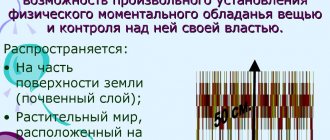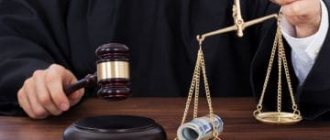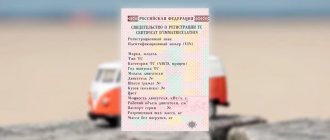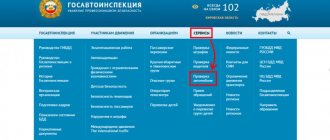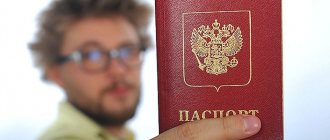The regulatory framework is very rich in various terms and concepts that are not always correctly interpreted in everyday life.
For example, from the point of view of the average person, the owner and owner of property are one and the same. But from a legal point of view, these concepts are not identical.
Next, let's try to understand what an owner, possessor, copyright holder and tenant are. What is common and what is the difference between these participants in the legal field?
Interpretation of concepts
In legal law, an owner is an individual or legal entity who owns, uses and disposes of property on the basis of a document confirming this right . In this case, the item of use may be in sole or common ownership, which affects the regulations for its alienation.
The owner, within the framework of the legal field, is considered to be a person who actually possesses a thing, but may not have documented ownership of it.
In legal practice, this is the name given mainly to citizens who have the right to use property with the possibility of transferring it. For example, you can own a car under a general power of attorney, but not be its owner.
The copyright holder is considered to be an individual or legal entity who has the right to own property on the basis of an agreement on the transfer of rights. Tenants are persons who own and use property under a lease or sublease agreement.
Responsibility for violation of current legislation
Subject: head of the organization
Responsibility: administrative, criminal
What is provided for: Code of Administrative Offenses of the Russian Federation, Criminal Code of the Russian Federation
The legislation contains a huge number of standards, rules, orders and procedures, for violation of which not only the legal entities themselves, but also their managers are brought to administrative and, if the result of the act is more disastrous, to criminal liability. You didn’t return or issue a cash receipt to the buyer, you didn’t notify the relevant authority about the conclusion of an employment contract with a migrant, you violated the deadline for notifying the company’s founder about an extraordinary meeting of the company’s participants - you will receive a fine, both for this company itself and for its director. It is better to familiarize yourself with specific risks in advance, depending on the field of activity, by reading the Code of Administrative Offenses of the Russian Federation and the Criminal Code of the Russian Federation at your leisure. The fines can be significant. The saddest thing: disqualification of the leader and, of course, imprisonment.
As for criminal liability specifically for tax crimes (Articles 198, 199, 199.1, 199.2, 199.3, 199.4 of the Criminal Code of the Russian Federation), there are several nuances.
From 2021, new thresholds for criminal prosecution for tax evasion have been established. Up to 2.7 million for individuals. And up to 15 million for legal entities. It is worth noting that the average amount of additional charges per GNP is 32 million rubles. That is, any average tax audit gives grounds for initiating a criminal case (of course, if the taxpayer has not repaid the additional charges presented).
Criminal liability may also arise for non-payment of insurance premiums. The threshold for liability is the same as for taxes. The same articles apply to such crimes (Articles 198, 199 of the Criminal Code of the Russian Federation). However, there are nuances here too. Crimes for non-payment of insurance premiums for compulsory social insurance against industrial and professional accidents are highlighted separately. diseases (Articles 199.3, 199.4 of the Criminal Code of the Russian Federation). For them, the threshold for attracting is lower: 1.8 million rubles. for individuals; 6 million for legal entities.
Special emphasis on Art. 199.2 of the Criminal Code - concealment of property from collection of taxes and insurance premiums. Dashing business owners or managers, sensing something is wrong and holding in their hands the just-delivered decision of the tax authority to order an on-site audit, are feverishly looking for a way to withdraw money or property from potential collection.
But in vain. This crime is very formal. It is relatively easy to prove. The fact of transferring money, alienating property and even directing proceeds bypassing the potential debtor directly to suppliers and contractors is a crime. Of course, if its cost starts from 2.25 million rubles.
Owner and proprietor: what's the difference?
The difference between these definitions has been emphasized since the emergence of Roman law, a feature of which was the presence of 2 independent legal institutions: the right of possession and property rights.
Possession was defined by Roman jurists as the actual dominion of a person over a certain thing without legal title . In this case, the object was always material things, and two elements were distinguished in the composition of possession: “the soul of possession” and “the body of possession.”
First, “soul” is the possessive will, i.e. the desire and intention of the owner to possess a thing for himself, without recognizing the dominance of other persons over it. It is noteworthy that from this position even a thief in Rome was considered an owner. “Body of possession” is the state of actual possession.
The differences between ownership and property rights in the modern regulatory framework are as follows:
- Possession is distinguished from ownership by the absence of title.
- In the modern interpretation of property rights, the actual possession of a thing, object, real estate does not matter; the owner has all rights of use that are based on legal title, i.e. a document of title, which is kept by the owner even in cases where the property is transferred to another person or has left the owner’s possession against his will.
So, the owner is always the owner, but the owner is not always the owner . Then a reasonable question arises: who is, for example, a person driving a car by proxy? We answer: also the owner of the vehicle, but only for the period while the right of ownership is transferred to him by the owner.
According to clause 1 of Article 209 of the Civil Code of the Russian Federation, the owner has the rights to own, use and dispose of his property.
Possession makes it possible to actually have, to actually possess some property at the moment, but not to dispose of it. The right of use means the ability to use this property, consume it and extract useful qualities. The right of disposal makes it possible to change the fate of property, for example, to destroy, sell, donate, exchange.
However, the same article of the Civil Code states that the owner has the right to transfer all of the above powers (one, two or all together) to another person on the basis of any document, for example, a power of attorney issued by him containing a list of rights granted.
But the owner, having transferred the right of ownership to another person, still remains the owner and is only temporarily deprived of the opportunity to use his property from the moment of its transfer. The powers transferred to them will now belong not to the owner, but to the new legal owner by proxy.
It is important to distinguish between legal and illegal ownership of property . Illegal possession does not give any powers, but it entails a burden of responsibility.
What rights does the property owner have?
The owner is not necessarily the person who bought or received the property as a gift; it can also be a trustee or a person using the property on a leasehold basis. To own means to possess property or a thing, to be able to perform actions with it that are not prohibited by law, as well as to exercise full control over it, protection, storage, etc.
The basis for ownership of property can be a lease agreement, a power of attorney for the right to drive a car, etc. The owner can possess and use the property only within the limits established by the owner. If the latter can freely sell, donate, exchange or otherwise give away his thing, then the owner will be limited in such rights.
Question and answer
In what cases can an apartment be seized? At the same time, an owner who is not the owner, just like the owner, can demand the return of property in the event of its illegal possession by an unauthorized person. In the event of loss of property and its sale to third parties, the owner has the right to demand the cancellation of the transaction in order to return the property back, as well as demand income received by persons who illegally used the property to obtain material benefits. If a dispute arose between the owner and the possessor, then the latter can file a vindication claim (the owner’s claim to recover a thing from someone else’s illegal possession), citing the fact that the thing is in his property.
Is the copyright holder the owner or the tenant?
Now let’s compare the concepts of “owner”, “copyright holder” and “tenant”. It would seem that who else but the owner has all the rights to the property that belongs to him. But no, not always, so these definitions cannot be identified. And the owner will not always be the copyright holder, and the copyright holder may not be the owner .
Copyright holder is a broader concept. It covers owners, possessors, tenants, owners of land on the right of lifelong inheritable possession and perpetual use, holders of easement rights, etc.
The difference between copyright holders lies in the scope of their powers . So, for example, the owner has the right to own, use and dispose of land, the tenant has the right to only own and use, but not fully dispose of it (can sublease, but does not have the right to sell); the owner is also limited in his authority to dispose of the property.
The owner himself, transferring the right of ownership to another person, for example, on the basis of a lease agreement, also loses the right to use his property for the duration of the agreement.
Thus, all the concepts we are considering are very similar, sometimes interchangeable, but in themselves they represent different concepts that have long been entrenched in legal practice.
Living space
Residential premises become property as a result of privatization, a purchase agreement and by will. An individual can use a house or apartment for his or his family members’ residence. At the same time, the rights of the owner are the use of housing only for its intended purpose. Such premises cannot be operated as an industrial enterprise and for other purposes not specified by law.
The owner also has the right to make repairs and rearrangements in an apartment or house without affecting the interests of the owners of neighboring housing and without violating sanitary and technical requirements. An individual is obliged to ensure the safety of utility rooms and technical equipment in the house, adhere to safety rules and take measures to quickly eliminate malfunctions on their own or with the help of special enterprises.
Who is the copyright holder of a real estate property?
The copyright for the drawings is included in the register of copyright objects of the People's Republic of China. Can the copyright holder, through an authorized representative, make a claim on the territory of Russia? Trademarks are not registered in Rosreestr. Only after registration with Rospatent. You should not contact Rosreestr: According to Russian legislation, the use of a trademark is possible without notifying the Federal Service for Intellectual Property Rospatent. However, until you are the owner of a certificate of exclusive right to use the mark, the latter has no legal force and is not protected by law. Official registration of a trademark based on the provisions of the Civil Code of the Russian Federation will help you avoid troubles. I am a single mother of 2 children. I filed an application for dissolution. I provided all the documents to the Pension Fund, except for the obligation, i.e. The Pension Fund refused to issue it to me, citing an insufficient number of documents, a complaint was written on my part explaining the above reasons, and a refusal was also received. How to correctly draw up a statement of claim in court. Read answers 1 If an extract from the Unified State Register of Real Estate about a property indicates one copyright holder, then how can you find out whether any other owners may emerge? Good day to you. If there are no more copyright holders in the USR statement, then they will not appear.
Related materials:
Men | Michael Kors | Paco Rabanne | Hugo Boss | Instinct | Relationships | jealousy | Michael Kors | Paco Rabanne
Articles
- The most dangerous races February 09, 2021, 00:00
- Great tandem: perfume and aftershave June 17, 2021, 00:00
- Don't joke with a woman: Forbidden topics April 01, 2021, 00:00
Video
- Paco Rabanne Intro May 21, 2009, 10:01
- Paco Rabanne BlackXS tv spot 08 June 2009, 00:12
- Ultrared by Paco Rabanne June 20, 2009, 12:38 pm
What it is
Land plots can be transferred to citizens and legal entities for ownership, as well as for temporary or indefinite use. In each of these cases, the owners have a legal right to use the land for its intended purpose (for example, agricultural land can only be used for growing agricultural products or other similar purposes). Restrictions on the rights of owners or possessors are permitted only in cases provided for by law or based on the terms of contracts.
Legislative acts allow the following forms of encumbrances on land:
- prohibitions and restrictions established in regulations and targeted restrictions on certain areas of land use (for example, a ban on constructing industrial and production facilities on lands allocated for personal farming);
- restrictions associated with the emergence of a public or private easement, i.e. the ability of third parties to use someone else's land plot;
- prohibitions and restrictions related to the emergence of legal claims - arrest to secure a claim or to ensure enforcement actions;
- restrictions on the ownership and disposal of land that arise with the consent of the copyright holder (for example, a mortgage when purchasing land on credit);
- temporary restrictions associated with the conclusion of a lease agreement (when transferring ownership of land, lease relations are maintained for the entire duration of the agreement).
Thus, various types of restrictions can arise directly by force of law, under the terms of contracts and agreements, as well as on the basis of judicial acts.
Based on the analysis of the norms of the Land Code of the Russian Federation and the Civil Code of the Russian Federation, we can distinguish the following types of encumbrances that can be established on land plots:
- public and private easements;
- mortgage encumbrance;
- a lease agreement whose term exceeds one year;
- arrest imposed by a judicial act or resolution of an official of the FSSP;
- trust management;
- concession.
In some cases, a prohibition or encumbrance may arise based on the special status of the property located on the site. For example, a historical heritage site automatically imposes restrictions on the corresponding land area.
Sources
- Law of the Russian Federation on copyright and related rights. - M.: BEK, 1993. - 849 p.
- Criminal Procedure Code of the Russian Federation. Text with changes and additional on February 10, 2011 / Team of authors. - Moscow: Nauka, 2011. - 781 p.
- Sergeeva O. S. Practice of considering cases of violations of antimonopoly legislation by credit and insurance organizations; Synergy - M., 2008. - 492 p.
- Postovoy, N.V. Municipal law in Russia. Questions and answers / N.V. Guard. - M.: Jurisprudence, 2002. - 160 p.
- Pokrovsky, I.A. History of Roman law / I.A. Pokrovsky. - M.: Legal book warehouse PRAVO', 1995. - 465 p.





